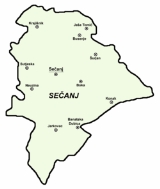
Secanj
Encyclopedia

Central Banat District
Central Banat District is a northeastern district of Serbia. It lies in the region of Banat, in the autonomous province of Vojvodina. It has a population of 208,456...
of Vojvodina
Vojvodina
Vojvodina, officially called Autonomous Province of Vojvodina is an autonomous province of Serbia. Its capital and largest city is Novi Sad...
, Serbia
Serbia
Serbia , officially the Republic of Serbia , is a landlocked country located at the crossroads of Central and Southeast Europe, covering the southern part of the Carpathian basin and the central part of the Balkans...
. The village has a population of 2,645, while the Sečanj municipality has 16,298 inhabitants.
Name
"Sečanj" is a SlavicSlavic languages
The Slavic languages , a group of closely related languages of the Slavic peoples and a subgroup of Indo-European languages, have speakers in most of Eastern Europe, in much of the Balkans, in parts of Central Europe, and in the northern part of Asia.-Branches:Scholars traditionally divide Slavic...
name for the first month in the calendar year. The Serbian Ekavian variant of this name was eventually replaced with the new word "Januar" (corresponding to the common months as known in Western European cultures), while the Croatian Ijekavian variant "Siječanj" remains in use in Croatia.
In Serbian
Serbian language
Serbian is a form of Serbo-Croatian, a South Slavic language, spoken by Serbs in Serbia, Bosnia and Herzegovina, Montenegro, Croatia and neighbouring countries....
, the village is known as Сечањ or Sečanj, in Hungarian
Hungarian language
Hungarian is a Uralic language, part of the Ugric group. With some 14 million speakers, it is one of the most widely spoken non-Indo-European languages in Europe....
as Szécsány or Torontálszécsány, in German
German language
German is a West Germanic language, related to and classified alongside English and Dutch. With an estimated 90 – 98 million native speakers, German is one of the world's major languages and is the most widely-spoken first language in the European Union....
as Setschan or Petersheim, in Croatian
Croatian language
Croatian is the collective name for the standard language and dialects spoken by Croats, principally in Croatia, Bosnia and Herzegovina, the Serbian province of Vojvodina and other neighbouring countries...
as Sečanj, and in Romanian
Romanian language
Romanian Romanian Romanian (or Daco-Romanian; obsolete spellings Rumanian, Roumanian; self-designation: română, limba română ("the Romanian language") or românește (lit. "in Romanian") is a Romance language spoken by around 24 to 28 million people, primarily in Romania and Moldova...
as Seceani.
Serbian, Hungarian, and Romanian language are officially used by municipal authorities.
Historical population of the village
- 1837: 1,489
- 1900: 2,596
- 1961: 2,829
- 1971: 2,906
- 1981: 2,718
- 1991: 2,688
Inhabited places
The Sečanj municipality includes the town of Jaša Tomić and the following villages:- Sečanj
- Banatska DubicaBanatska DubicaBanatska Dubica is a village in Serbia. It is situated in the Sečanj municipality, in the Central Banat District, Vojvodina province. The village has a Serb ethnic majority and its population numbering 428 people .-References:...
- BokaBoka (village)Boka is a village located in the Sečanj municipality, in the Central Banat District of Serbia. It is situated in the Autonomous Province of Vojvodina...
- BusenjeBusenjeBusenje is a village in Serbia. It is situated in the Sečanj municipality, in the Central Banat District, Vojvodina province. The village has a Hungarian ethnic majority and its population numbering 94 people .-References:*Slobodan Ćurčić, Broj stanovnika Vojvodine, Novi Sad, 1996....
- JarkovacJarkovacJarkovac is a village in Serbia. It is situated in the Sečanj municipality, Central Banat District, Vojvodina province. The village has a Serb ethnic majority and its population numbering 1,817 people .-References:...
- Konak
- KrajišnikKrajišnikKrajišnik is a village in Serbia. It is situated in the Sečanj municipality, Central Banat District, Vojvodina province. The village has a Serb ethnic majority and its population is 2,241 people .-Name:...
- NeuzinaNeuzinaNeuzina is a village in Serbia. It is situated in the Sečanj municipality, in the Central Banat District, Vojvodina province. The village is ethnically mixed and its population numbering 1,371 people , including 680 Serbs, 488 Hungarians, 95 Roma, and others.- History :Historically, there were two...
- Sutjeska
- ŠurjanŠurjanŠurjan is a village in Serbia. It is situated in the Sečanj municipality, in the Central Banat District, Vojvodina province...
Ethnic groups (2002 census)
The population of the Sečanj municipality:- SerbsSerbsThe Serbs are a South Slavic ethnic group of the Balkans and southern Central Europe. Serbs are located mainly in Serbia, Montenegro and Bosnia and Herzegovina, and form a sizable minority in Croatia, the Republic of Macedonia and Slovenia. Likewise, Serbs are an officially recognized minority in...
= 11,607 (70.87%) - Hungarians = 2,068 (12.63%)
- RomaniansRomaniansThe Romanians are an ethnic group native to Romania, who speak Romanian; they are the majority inhabitants of Romania....
= 642 (3.92%) - Roma = 609 (3.72%)
- YugoslavsYugoslavsYugoslavs is a national designation used by a minority of South Slavs across the countries of the former Yugoslavia and in the diaspora...
= 266 (1.62%) - CroatsCroatsCroats are a South Slavic ethnic group mostly living in Croatia, Bosnia and Herzegovina and nearby countries. There are around 4 million Croats living inside Croatia and up to 4.5 million throughout the rest of the world. Responding to political, social and economic pressure, many Croats have...
= 148 (0.9%) - BulgariansBulgariansThe Bulgarians are a South Slavic nation and ethnic group native to Bulgaria and neighbouring regions. Emigration has resulted in immigrant communities in a number of other countries.-History and ethnogenesis:...
= 114 (0.7%)
The settlements with Serb ethnic majority are: Sečanj, Banatska Dubica, Jarkovac, Jaša Tomić, Krajišnik, and Sutjeska. The settlement with Hungarian ethnic majority is Busenje. Ethnically mixed settlements with relative Serb majority are: Konak, Neuzina, Boka and Šurjan.

